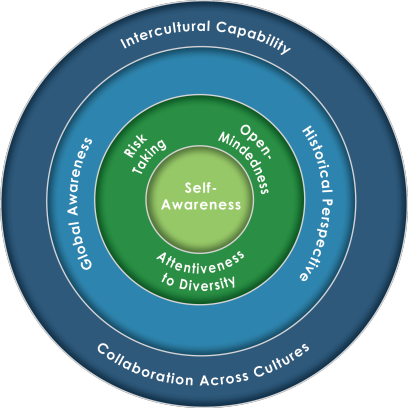Diversity, Equity, Inclusion, and Belonging
Our organization’s training roots are in Diversity, Equity, Inclusion, and Belonging (DEIB) programming, which we call Diversity Perspectives™. The objectives of DEIB parallel seamlessly with those of global competence—appreciating and respecting people of diverse backgrounds so they feel included and have a sense of belonging.
The Global Competence Model™ can provide a robust structure that can be flexible to various DEIB situations. Although, instead of a global span, the scope for DEIB can be adapted to regional, national, or local geography, as desired.
Aligning DEIB initiatives with a competency framework fosters more holistic approaches to DEIB for truly inclusive applications throughout the organization. Our knowledge, skills, and attitudes (KSA) approach follows:

Self-awareness, especially unconscious bias and the realization of potential gaps between personal preference compared with social norms or mores in a different situation;
Respectful and non-judgmental attitudes towards groups and individuals from diverse backgrounds;
Knowledge or awareness of different views, values, issues, concerns, religions, societies, and ways of living;
Adaptive and collaborative interpersonal skills that bridge various aspects of diversity to foster inclusivity and a sense of belonging.

Historically, a lot of Diversity and Inclusion (D&I) initiatives and programs have focused on physical dimensions of diversity, such as race, ethnicity, and gender. While diverse physical representation is critical, most people want to be appreciated and valued for who they are on the inside and NOT simply categorized by how they look or are perceived on the outside. People in marginalized groups have many things in common with predominant groups, and when we choose to explore our commonalities rather than just our differences, we can break down barriers to equity.

Therefore, to truly be inclusive of all that a person has to offer, we ultimately need to look beyond outward appearance and foster a sense of holistic inclusivity by celebrating all dimensions of diversity.

The challenge is that physical aspects of diversity are more obvious than more covert aspects of diversity, such as a person’s education, experience, personality, thinking style(s), values, cultural identity, and spiritual or religious beliefs, among many other things. However, these more hidden aspects of diversity represent how we see ourselves, and most often they are what we want others to know and understand about us.

Most DEIB experts recognize that diversity appreciation and inclusion of people from different national origins is the hardest facet to address, due in large part to the hidden or less visible nature of these differences.

For this reason, if people strive to be attentive to and inclusive of cultural diversity, they will have developed the sensitivity and skills to be inclusive of any facet of diversity.

There is a very pragmatic element to cultural diversity appreciation, too. Due to global migration, there is constant flux and movement of people from different cultural origins to new and different locations, and they bring diverse cultural values and traditions with them, such as different languages, foods, and religions. To truly be inclusive of ALL peoples in a given community or organization, the varied backgrounds of such internationals should not be ignored. They want to feel included and have a sense of belonging, too.

Organizations are at different stages on their path towards inclusivity, with varied needs among the stakeholders in their communities and organizations, including workers, suppliers, and customers. Regardless of where you are on your journey towards developing equity, inclusivity, and a sense of belonging across any or all dimensions of diversity, we can assist you.
Diversity Perspectives™ programs can be delivered independently or in conjunction with targeted Global Competence Aptitude Assessment (GCAA)® metrics in order to diagnose and prioritize personal and organizational DEIB development program efforts. You can also use the GCAA® for your own internal DEIB program delivery. Regardless of whether or not you use an assessment, our preferred approach is to curate content and to customize programs in order to meet participant and client priorities and needs.
Contact Us
For More Information



